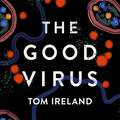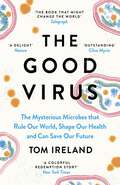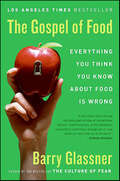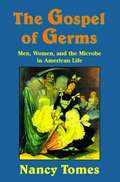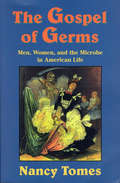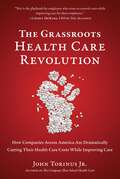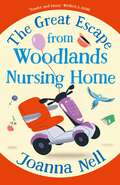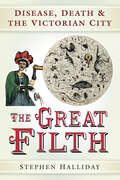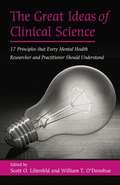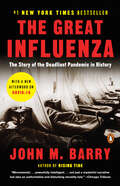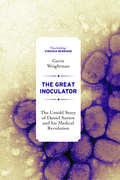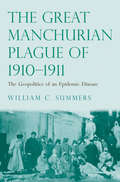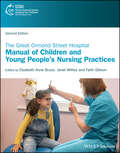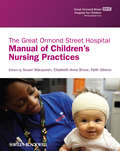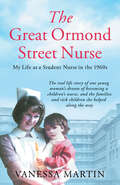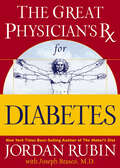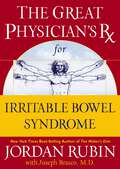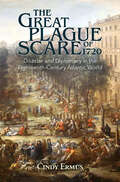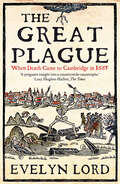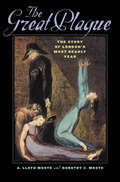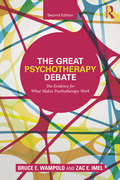- Table View
- List View
The Good Virus: The Untold Story of Phages: The Most Abundant Life Forms on Earth and What They Can Do For Us
by Tom IrelandThe untold story of the most abundant life form on Earth, bacteriophages, and how they play a crucial role in our lives, our health and the health of our planet.Winner of the Giles St Aubyn Award 2021Not all viruses are out to get us - in fact, the viruses that do us harm are vastly outnumbered by viruses that can actually save lives.At every moment, within your body and all around you, trillions of microscopic combatants are fighting an invisible war. Countless times per second, 'good' viruses known as phages are infecting and destroying bacteria. These phages are the most abundant life form on the planet and have an incredible power to heal rather than harm. So why have most of us never even heard of them?The Good Virus reveals how personalities, power and politics have repeatedly crashed together to hinder our understanding of these weird and wonderful life forms. We explore why Stalin's Soviet Union embraced using phages to fight disease but the rest of the world shunned the idea. We find out why scientists only recently realised phages are central to all ecosystems on Earth. And we meet the often eccentric phage heroes who have shaped the strange history of this field and are unlocking its exciting future.Faced with the terrifying threat of antibiotic-resistant superbugs, we need phages now more than ever. The Good Virus celebrates what phages could do for us and our planet if they are at last given the attention they deserve.(P) 2023 Hodder & Stoughton Limited
The Good Virus: The Untold Story of Phages: The Most Abundant Life Forms on Earth and What They Can Do For Us
by Tom Ireland'Superb ... This is luxury-class science writing'DAILY TELEGRAPH, 5* review'A delight. To learn more about phages is to discover fascinating details about a hidden world'NATURE'Outstanding'CLIVE MYRIE'This thrilling book will amaze you'MATTHEW COBB__________Not all viruses are out to get us - in fact, the viruses that do us harm are vastly outnumbered by viruses that can actually save lives.At every moment, within your body and all around you, trillions of microscopic combatants are fighting an invisible war. Countless times per second, 'good' viruses known as phages are infecting and destroying bacteria. These phages are the most abundant life form on the planet and have an incredible power to heal rather than harm. So why have most of us never even heard of them?The Good Virus reveals how personalities, power and politics have repeatedly crashed together to hinder our understanding of these weird and wonderful life forms. We explore why Stalin's Soviet Union embraced using phages to fight disease but the rest of the world shunned the idea. We find out why scientists only recently realised phages are central to all ecosystems on Earth. And we meet the often eccentric phage heroes who have shaped the strange history of this field and are unlocking its exciting future.Faced with the threat of antibiotic resistance, we need phages now more than ever. The Good Virus celebrates what phages could do for us and our planet if they are at last given the attention they deserve.__________'A new scientific frontier that couldn't be more fascinating or vital. This book is ahead of the curve and deserves to become a classic.'DANIEL M. DAVIS'Incredible and though provoking. Phages are the superheroes of the human biome.'SUE BLACK
The Gospel of Food: Why We Should Stop Worrying and Enjoy What We Eat
by Barry GlassnerFor many Americans, eating is a religion. We worship at the temples of celebrity chefs. We raise our children to believe that certain foods are good and others are bad. We believe that if we eat the right foods, we will live longer, and if we eat in the right places, we will raise our social status. Yet what we believe to be true about food is, in fact, quite contradictory.Part exposé, part social commentary, The Gospel of Food is a rallying cry to abandon the fads and fallacies in favor of calmer, more pleasurable eating. By interviewing chefs, food chemists, nutritionists, and restaurant critics about the way we eat, sociologist Barry Glassner helps us recognize the myths, half-truths, and guilt trips they promulgate, and liberates us for greater joy at the table.
The Gospel of Germs: Men, Women, and the Microbe in American Life
by Nancy TomesAIDS. Ebola. "Killer microbes. " All around us the alarms are going off, warning of the danger of new, deadly diseases. And yet, as Nancy Tomes reminds us in her absorbing book, this is really nothing new. A remarkable work of medical and cultural history, The Gospel of Germs takes us back to the first great "germ panic" in American history, which peaked in the early 1900s, to explore the origins of our modern disease consciousness. Little more than a hundred years ago, ordinary Americans had no idea that many deadly ailments were the work of microorganisms, let alone that their own behavior spread such diseases. The Gospel of Germs shows how the revolutionary findings of late nineteenth-century bacteriology made their way from the laboratory to the lavatory and kitchen, with public health reformers spreading the word and women taking up the battle on the domestic front. Drawing on a wealth of advice books, patent applications, advertisements, and oral histories, Tomes traces the new awareness of the microbe as it radiated outward from middle-class homes into the world of American business and crossed the lines of class, gender, ethnicity, and race. Just as we take some of the weapons in this germ war for granted--fixtures as familiar as the white porcelain toilet, the window screen, the refrigerator, and the vacuum cleaner--so we rarely think of the drastic measures deployed against disease in the dangerous old days before antibiotics. But, as Tomes notes, many of the hygiene rules first popularized in those days remain the foundation of infectious disease control today. Her work offers a timely look into the history of our long-standing obsession with germs, its impact on twentieth-century culture and society, and its troubling new relevance to our own lives.
The Gospel of Germs: Men, Women, and the Microbe in American Life
by Nancy TomesAIDS. Ebola. “Killer microbes.” All around us the alarms are going off, warning of the danger of new, deadly diseases. And yet, as Nancy Tomes reminds us in her absorbing book, this is really nothing new. A remarkable work of medical and cultural history, The Gospel of Germs takes us back to the first great “germ panic” in American history, which peaked in the early 1900s, to explore the origins of our modern disease consciousness. Little more than a hundred years ago, ordinary Americans had no idea that many deadly ailments were the work of microorganisms, let alone that their own behavior spread such diseases. The Gospel of Germs shows how the revolutionary findings of late nineteenth-century bacteriology made their way from the laboratory to the lavatory and kitchen, with public health reformers spreading the word and women taking up the battle on the domestic front. Drawing on a wealth of advice books, patent applications, advertisements, and oral histories, Tomes traces the new awareness of the microbe as it radiated outward from middle-class homes into the world of American business and crossed the lines of class, gender, ethnicity, and race. Just as we take some of the weapons in this germ war for granted—fixtures as familiar as the white porcelain toilet, the window screen, the refrigerator, and the vacuum cleaner—so we rarely think of the drastic measures deployed against disease in the dangerous old days before antibiotics. But, as Tomes notes, many of the hygiene rules first popularized in those days remain the foundation of infectious disease control today. Her work offers a timely look into the history of our long-standing obsession with germs, its impact on twentieth-century culture and society, and its troubling new relevance to our own lives.
The Grassroots Health Care Revolution: How Companies Across America Are Dramatically Cutting Their Health Care Costs While Improving Care
by John TorinusWhen exploding health care costs threatened Serigraph's solvency, the CEO went outside the box to find a solution. John Torinus Jr. applied innovative, cutting-edge strategies to cut his health care expenses well below the national average while improving his employees' care. Now, across America, leading companies are following Serigraph's example. There is a revolution brewing. A revolution that will dramatically lower health costs nationwide. John Torinus Jr., author of The Company That Solved Health Care, the eye-opening book detailing one company's game-changing health care program, now presents The Grassroots Health Care Revolution. Featuring examples and interviews with the business leaders who are at the forefront of these innovations, The Grassroots Health Care Revolution is a game plan for improving workforce health and radically lowering health costs. Torinus avoids the politics of health care to focus on what businesses can actually control. He shows how pioneering corporations have engaged their employees to tame the hyper-inflation that has plagued the health care industry for decades. Executives in leading companies are deploying management disciplines and marketplace principles to invent a better business model for health care. These companies are bending the curve, growing profits and improving the health of their employees. Learn how you and your business can join the revolution.
The Great Brain Debate: Nature Or Nurture?
by John E. DowlingHow much of our behavior is determined by our genes and how much by our environment? Fiercely debated but not fully resolved, we continue to grapple with this nature-vs.-nurture question. But data from the study of the developing and adult brain are providing us with new ways of thinking about this issue – ways that, finally, promise answers. Whether our personality, our intelligence, and our behavior are more likely to be shaped and affected by our environment or our genetic coding is not simply an idle question for today’s researchers. There are tremendous consequences to understanding the crucial role that each plays. How we raise and educate our children, how we treat various mental diseases or conditions, how we care for our elderly – these are just some of the issues that can be informed by a better and more complete understanding of brain development. John Dowling, eminent neuroscience researcher, looks at these and other important issues. The work that is being done by scientists on the connection between the brain and vision, as well as the ways in which our brains help us learn new languages, are particularly revealing. From this groundbreaking new research we are able to gain startling new insights into how the brain functions and how it can (or cannot) be molded and changed. By studying the brain across the spectrum of our lives, from infancy through adulthood and into old age, we see how the brain develops, transforms, and adjusts through the years. Looking specifically at early development and then at the opportunities for additional learning and development as we grow older, we learn more about the ways in which both nature and nurture play key roles over the course of a human lifetime.
The Great Escape from Woodlands Nursing Home: A gorgeously uplifting novel from the bestselling author of THE SINGLE LADIES OF JACARANDA RETIREMENT VILLAGE
by Joanna NellAt nearly ninety, retired nature writer Hattie Bloom prefers the company of birds to people, but when a fall lands her in a nursing home she struggles to cope with the loss of independence and privacy. From the confines of her 'room with a view' - of the car park! - she dreams of escape.Fellow 'inmate', the gregarious, would-be comedian Walter Clements also plans on returning home as soon as he is fit and able to take charge of his mobility scooter.When Hattie and Walter officially meet at The Night Owls, a clandestine club run by Sister Bronwyn and her dog, Queenie, they seem at odds. But when Sister Bronwyn is dismissed over her unconventional approach to aged care, they must join forces - and very slowly, an unlikely, unexpected friendship begins to grow.Full of wisdom and warmth, The Great Escape from Woodlands Nursing Home is a gorgeously poignant, hilarious story showing that it is never too late to laugh - or to love.(P) 2020 Hachette Australia
The Great Escape from Woodlands Nursing Home: A totally laugh out loud and uplifting novel of friendship, love and aging disgracefully
by Joanna Nell'I loved the characters with all their quirkiness and hilarious situations they find themselves as they face living in a nursing home... Many laugh out loud moments... Wonderful' Reader review ⭐⭐⭐⭐⭐At nearly ninety, retired nature writer Hattie Bloom prefers the company of birds to people, but when a fall lands her in a nursing home she struggles to cope with the loss of independence and privacy. From the confines of her 'room with a view' - of the car park! - she dreams of escape. Fellow 'inmate', the gregarious, would-be comedian Walter Clements also plans on returning home as soon as he is fit and able to take charge of his mobility scooter. When Hattie and Walter officially meet at The Night Owls, a clandestine club run by Sister Bronwyn and her dog, Queenie, they seem at odds. But when Sister Bronwyn is dismissed over her unconventional approach to aged care, they must join forces - and very slowly, an unlikely, unexpected friendship begins to grow. Full of wisdom and warmth, this is a gorgeously poignant, hilarious story showing that it is never too late to laugh or to love. Perfect for fans of Judy Leigh, Jill Mansell and Sally Page. Readers love The Great Escape from Woodlands Nursing Home:'Hilarious. Who doesn't love old people getting up to mischief?!' Reader review ⭐⭐⭐⭐⭐ 'A book that will leave you with a smile on your face. There are antics, laughter, and tears, but also a good read to be had. Highly recommended' Reader review ⭐⭐⭐⭐⭐'What a wonderful book this is! It's warm, empathetic, at times laugh-out-loud funny and at times it made me cry but overall it filled me with a sense of hope' Reader review ⭐⭐⭐⭐⭐'The characters in this story are just delightful and I was so absorbed with their stories that I read it in one sitting and really wished it would go on longer... Loved it' Reader review ⭐⭐⭐⭐⭐ Praise for Joanna Nell: 'Hugely entertaining . . . funny and heart-warming' Woman & Home 'Warm-hearted book that had me rooting for all the characters and laughing out loud' Libby Page, author of The Lido'Poignant and warm-hearted . . . a tonic for our times' Holly Miller, author of The Sight of You 'A warm and touching story with a cast of characters who became my friends' Katie Marsh, author of How Not to Murder Your Ex 'A funny and poignant exploration of growing old disgracefully' Culturefly
The Great Filth: Disease, Death and the Victorian City
by Stephen HallidayVictorian Britain was the world's industrial powerhouse. Its factories, mills and foundries supplied a global demand for manufactured goods. As Britain changed from an agricultural to an industrial ecomony, people swarmed into the towns and cities where the work was; by the end of Queen Victoria's reign, almost 80 per cent of the population was urban. Overcrowding and filthy living conditions, though, were a recipe for disaster, and diseases such as cholera, typhoid, scarlet fever, smallpox and puerperal (childbed) fever were a part of everyday life for (usually poor) town-and city-dwellers. However, thanks to a dedicated band of doctors, nurses, midwives, scientists, engineers and social reformers, by the time the Victorian era became the Edwardian, they were almost eradicated, and no longer a constant source of fear. Stephen Halliday tells the fascinating story of how these individuals fought opposition from politicians, taxpayers and often their own colleagues to overcome these diseases and make the country a safer place for everyone to live.
The Great Ideas of Clinical Science: 17 Principles that Every Mental Health Professional Should Understand
by Scott O. Lilienfeld William T. O'Donohue<p>The idea that there is a fundamental rift between researchers and practitioners should not come as a surprise to anyone familiar with the current literature, trends, and general feelings in the field of clinical psychology. Central to this scientist-practitioner gap is an underlying disagreement over the nature of knowledge - namely that while some individuals point to research studies as the foundation of truth, others argue that clinical experience offers a more adequate understanding of the causes, assessment, and treatment of mental illness. <p>The Great Ideas of Clinical Science is an ambitious attempt to dig beneath these fundamental differences, and reintroduce the reader to unifying principles often overlooked by students and professionals alike. The editors have identified 17 such universals, and have pulled together a group of the most prolific minds in the field to present the philosophical, methodological, and conceptual ideas that define the state of the field. Each chapter focuses on practical as well as conceptual points, offering valuable insight to practicing clinicians, researchers, and teachers of any level of experience. Written for student, practitioner, researcher, and educated layperson, this integrative volume aims to facilitate communication among all mental health professionals and to narrow the scientist-practitioner gap.</p>
The Great Influenza: The Story of the Deadliest Pandemic in History
by John BarryAt the height of WWI, history's most lethal influenza virus erupted in an army camp in Kansas, moved east with American troops, then exploded, killing as many as 100 million people worldwide. <P><P>It killed more people in twenty-four months than AIDS killed in twenty-four years, more in a year than the Black Death killed in a century. But this was not the Middle Ages, and 1918 marked the first collision of science and epidemic disease. <P><P>Magisterial in its breadth of perspective and depth of research and now revised to reflect the growing danger of the avian flu, The Great Influenza is ultimately a tale of triumph amid tragedy, which provides us with a precise and sobering model as we confront the epidemics looming on our own horizon. <P><P>John M. Barry has written a new afterword for this edition that brings us up to speed on the terrible threat of the avian flu and suggest ways in which we might head off another flu pandemic. <P><P><b>A New York Times Bestseller</b>
The Great Inoculator: The Untold Story of Daniel Sutton and his Medical Revolution
by Gavin WeightmanSmallpox was the scourge of the eighteenth century: it showed no mercy, almost wiping out whole societies. Young and old, poor and royalty were equally at risk – unless they had survived a previous attack. Daniel Sutton, a young surgeon from Suffolk, used this knowledge to pioneer a simple and effective inoculation method to counter the disease. His technique paved the way for Edward Jenner&’s discovery of vaccination – but, while Jenner is revered, Sutton has been vilified for not widely revealing his methods until later in life. Gavin Weightman reclaims Sutton&’s importance, showing how the clinician&’s practical and observational discoveries advanced understanding of the nature of disease. Weightman explores Sutton&’s personal and professional development, and the wider world of eighteenth-century health in which he practised inoculation. Sutton&’s brilliant and exacting mind had a significant impact on medicine – the effects of which can still be seen today.
The Great Manchurian Plague of 1910-1911
by William C. SummersWhen plague broke out in Manchuria in 1910 as a result of transmission from marmots to humans, it struck a region struggling with the introduction of Western medicine, as well as with the interactions of three different national powers: Chinese, Japanese, and Russian. In this fascinating case history, William Summers relates how this plague killed as many as 60,000 people in less than a year, and uses the analysis to examine the actions and interactions of the multinational doctors, politicians, and ordinary residents who responded to it. Summers covers the complex political and economic background of early twentieth-century Manchuria and then moves on to the plague itself, addressing the various contested stories of the plague's origins, development, and ecological ties. Ultimately, Summers shows how, because of Manchuria's importance to the world powers of its day, the plague brought together resources, knowledge, and people in ways that enacted in miniature the triumphs and challenges of transnational medical projects such as the World Health Organization.
The Great Ormond Street Hospital Manual of Children and Young People's Nursing Practices
by Faith Gibson Elizabeth Anne Bruce Janet WillissThe Great Ormond Street Hospital Manual of Children and Young People’s Nursing Practices Clinical skills are essential in the provision of care for children and young people. The Great Ormond Street Hospital Manual of Children and Young People’s Nursing Practices provides expert guidance on evidence-based clinical procedures, helping students and newly registered nurses develop sound clinical judgement and confidence. This comprehensive resource covers all aspects of children’s nursing, from the fundamentals of everyday practice to advanced care in high dependency and intensive care settings. As such, its relevance and usefulness reach beyond those newly registered; it remains a valuable resource for experienced nurses wishing to further expand their nursing skills. Now in its second edition, this thoroughly updated guide demonstrates each procedure, explains the underlying theory and evidence, and speaks to the unique challenges of working with children and young people. New chapters address mental health, complementary therapies, learning difficulties, and the deteriorating child, whilst expanded content examines blood glucose monitoring, glucocorticoid treatment, insulin administration, diabetes care, surgical diathermy, non-invasive ventilation, and much more. Key Features Provides evidence-based guidelines for more than 300 clinical procedures Features an abundance of colour photographs and illustrations Examines the needs of neonates and adolescents in the context of interdisciplinary care Includes new material on health research and evidence-based practice, stages of development, children with complex needs, and admission, transfer, and discharge Complements The Royal Marsden Manual of Clinical Nursing Procedures, offering continuity to those working in both adult and paediatric settings The second edition of The Great Ormond Street Hospital Manual is an indispensable resource for registered nurses, students, and other healthcare professionals involved in delivering clinically effective, evidenced- based, family-centred care. Praise for the previous edition “This manual builds on the knowledge, skills and expertise of one of the UK’s finest children’s hospital and explains comprehensive, evidence-based care clearly.” Nursing Children and Young People Journal “All children’s nurses should have this book as a reference.” Nursing Standard “… a comprehensive resource for all qualified nurses, students and other healthcare professionals involved in caring for children in hospital and community settings.” Times Higher Education Supplement
The Great Ormond Street Hospital Manual of Children's Nursing Practices
by Susan Macqueen Faith Gibson Elizabeth BruceClinical skills are a fundamental aspect of nursing care of children and young people. The Great Ormond Street Hospital Manual of Children's Nursing Practices is an evidence-based manual of practical skills in children's nursing which builds on the extensive expertise developed at Great Ormond Street Hospital. It encompasses all aspects of children's nursing from the most basic aspects of everyday practice to advanced practice in high dependency and intensive care to provide a comprehensive resource for all qualified nurses, students, and other health-care professionals involved in caring for children, both in the hospital and the community setting.Children's and young people's nursing presents unique challenges. The Great Ormond Street Hospital Manual utilises the latest clinical research and expert clinical knowledge to address these challenges, and provides the underlying theory and evidence for nursing care of children. It provides a definitive guide to clinical skills procedures in children's and young people's nursing which enables nurses working with children and young people to practice confidently and deliver clinically effective family-centred care.Key featuresOffers access to clinical procedures developed through the extensive expertise from Great Ormond Street HospitalContains evidence-based recommendations for expert careEncompasses all aspects of children's careContains procedures guidelines students can rely on and effectively use in practice following qualficationHighlights specific needs of neonates and adolescentsPlaced in the context of inter-disciplinary care of the childIncludes the rationale for each procedure - the 'why' as well as 'how'Information presented in a similar way to The Royal Marsden Manual of Clinical Nursing Procedures - offering continuity to those working in both adult and paediatric settings
The Great Ormond Street Hospital Nurse: My Life As A Student Nurse In The 1960s
by Vanessa Martin“You must learn to hold in your feelings,” Matron said, firmly but not unkindly. “One day it will be your duty to support the family and other staff through this tragedy. You need to be strong.” From the first time Vanessa Martin sets foot inside the world’s most renowned children’s hospital, she knows that she will never have another dull moment. From her first confrontation with the legendary matron, to consoling hordes of worried parents and caring for the wonderful bundles of joy themselves, Vanessa enters a world full of laughter, heartache and, most importantly, hard work. In this heartwarming memoir of a passionate, determined young woman trying to help as many children as she can, Vanessa pulls back the curtain on the bustling world of 60s London, and tells the remarkable story of finding her place within it. Nostalgic, charming and full of heart, The Great Ormond Street Nurse is the heroic tale of a woman who has dedicated over 40 years to the NHS.
The Great Ormond Street Hospital Nurse: My Life As A Student Nurse In The 1960s
by Vanessa Martin“You must learn to hold in your feelings,” Matron said, firmly but not unkindly. “One day it will be your duty to support the family and other staff through this tragedy. You need to be strong.” From the first time Vanessa Martin sets foot inside the world’s most renowned children’s hospital, she knows that she will never have another dull moment. From her first confrontation with the legendary matron, to consoling hordes of worried parents and caring for the wonderful bundles of joy themselves, Vanessa enters a world full of laughter, heartache and, most importantly, hard work. In this heartwarming memoir of a passionate, determined young woman trying to help as many children as she can, Vanessa pulls back the curtain on the bustling world of 60s London, and tells the remarkable story of finding her place within it. Nostalgic, charming and full of heart, The Great Ormond Street Nurse is the heroic tale of a woman who has dedicated over 40 years to the NHS.
The Great Physician's Rx for Diabetes (The Great Physician's Rx)
by Jordan Rubin Joseph BrascoBestselling author Jordan Rubin, with David Remedios, M.D., shows how to adopt the 7 Keys in The Great Physician's Rx for Health and Wellness to focus aggressively on diabetes and develop a game plan against it.
The Great Physician's Rx for Irritable Bowel Syndrome (Rubin Series)
by Jordan RubinJordan Rubin, along with Joseph Brasco, MD, shows readers how to apply the 7 Keys to Health and Wellness and naturally fight Irritable Bowel Syndrom, a painful and debilitating disease.
The Great Plague Scare of 1720: Disaster and Diplomacy in the Eighteenth-Century Atlantic World (Global Health Histories)
by Cindy ErmusFrom 1720 to 1722, the French region of Provence and surrounding areas experienced one of the last major epidemics of plague to strike Western Europe. The Plague of Provence was a major disaster that left in its wake as many as 126,000 deaths, as well as new understandings about the nature of contagion and the best ways to manage its threat. In this transnational study, Cindy Ermus focuses on the social, commercial, and diplomatic impact of the epidemic beyond French borders, examining reactions to this public health crisis from Italy to Great Britain to Spain and the overseas colonies. She reveals how a crisis in one part of the globe can transcend geographic boundaries and influence society, politics, and public health policy in regions far from the epicentre of disaster.
The Great Plague: A People's History
by Evelyn LordFocusing on Britain&’s peasants, shopkeepers, and other commoners, this history of the deadly Black Plague is a &“local account of the countrywide calamity&” (The Times). In this intimate history of the extraordinary Black Plague pandemic that swept through the British Isles in 1665, Evelyn Lord focuses on the plague&’s effects on smaller towns, where every death was a singular blow affecting the entire community. Lord&’s fascinating reconstruction of life during plague times presents the personal experiences of a wide range of individuals, from historical notables Samuel Pepys and Isaac Newton to common folk who tilled the land and ran the shops. The Great Plague brings this dark era to vivid life—through stories of loss and survival from those who grieved, those who fled, and those who hid to await their fate. Includes maps, photos, and illustrations
The Great Plague: The Story of London's Most Deadly Year
by A. Lloyd Moote Dorothy C. MooteAn intimate portrait of the Great Plague of London.In the winter of 1664-65, a bitter cold descended on London in the days before Christmas. Above the city, an unusually bright comet traced an arc in the sky, exciting much comment and portending "horrible windes and tempests." And in the remote, squalid precinct of St. Giles-in-the-Fields outside the city wall, Goodwoman Phillips was pronounced dead of the plague. Her house was locked up and the phrase "Lord Have Mercy On Us" was painted on the door in red. By the following Christmas, the pathogen that had felled Goodwoman Phillips would go on to kill nearly 100,000 people living in and around London—almost a third of those who did not flee. This epidemic had a devastating effect on the city's economy and social fabric, as well as on those who lived through it. Yet somehow the city continued to function and the activities of daily life went on.In The Great Plague, historian A. Lloyd Moote and microbiologist Dorothy C. Moote provide an engrossing and deeply informed account of this cataclysmic plague year. At once sweeping and intimate, their narrative takes readers from the palaces of the city's wealthiest citizens to the slums that housed the vast majority of London's inhabitants to the surrounding countryside with those who fled. The Mootes reveal that, even at the height of the plague, the city did not descend into chaos. Doctors, apothecaries, surgeons, and clergy remained in the city to care for the sick; parish and city officials confronted the crisis with all the legal tools at their disposal; and commerce continued even as businesses shut down.To portray life and death in and around London, the authors focus on the experiences of nine individuals—among them an apothecary serving a poor suburb, the rector of the city's wealthiest parish, a successful silk merchant who was also a city alderman, a country gentleman, and famous diarist Samuel Pepys. Through letters and diaries, the Mootes offer fresh interpretations of key issues in the history of the Great Plague: how different communities understood and experienced the disease; how medical, religious, and government bodies reacted; how well the social order held together; the economic and moral dilemmas people faced when debating whether to flee the city; and the nature of the material, social, and spiritual resources sustaining those who remained.Underscoring the human dimensions of the epidemic, Lloyd and Dorothy Moote dramatically recast the history of the Great Plague and offer a masterful portrait of a city and its inhabitants besieged by—and defiantly resisting—unimaginable horror.
The Great Plague: The Story of London's Most Deadly Year
by A. Lloyd Moote Dorothy C. MooteUnderscoring the human dimensions of the epidemic, historian A. Lloyd Moote and microbiologist Dorothy C. Moote provide an engrossing and deeply informed account of 1665, a cataclysmic plague year in London.
The Great Psychotherapy Debate: The Evidence for What Makes Psychotherapy Work
by Bruce E. Wampold Zac E. ImelThe second edition of The Great Psychotherapy Debate has been updated and revised to expand the presentation of the Contextual Model, which is derived from a scientific understanding of how humans heal in a social context and explains findings from a vast array of psychotherapies studies. This model provides a compelling alternative to traditional research on psychotherapy, which tends to focus on identifying the most effective treatment for particular disorders through emphasizing the specific ingredients of treatment. The new edition also includes a history of healing practices, medicine, and psychotherapy, an examination of therapist effects, and a thorough review of the research on common factors such as the alliance, expectations, and empathy.
